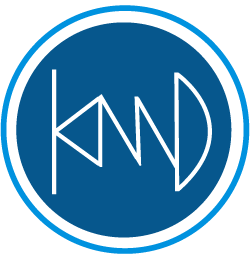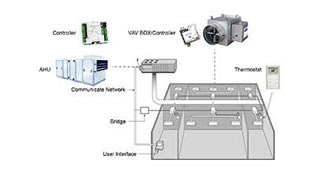VARIABLE AIR VOLUME CONTROL SYSTEM
- Piping and controls are factory installed, configured and tested
- LED display and manual controls for rapid diagnostics and service
- Variable speed technology adjusts fan speed to meet a space needs
- Low fan speeds results in quieter system
- Control algorithms reach set points faster allowing occupants to enjoy a more comfortable environment
Variable Air Volume (VAV) is a type of heating, ventilating, and/or air-conditioning (HVAC) system. The simplest VAV system incorporates one supply duct that, when in cooling mode, distributes approximately 55 °F (13 °C) supply air. Because the supply air temperature, in this simplest of VAV systems, is constant, the air flow rate must vary to meet the rising and falling heat gains or losses within the thermal zone served.
The VAV Zone Controller has a built-in actuator and maintains zone temperature by operating the terminal fan and regulating the flow of conditioned air into the space. Buildings with diverse loading conditions can be supported by controlling the local terminal’s supplemental heat. The VAV Zone Controller provides dedicated control functions for single duct, parallel fan box terminals and series fan box terminals with modulating heat, up to 2 stages of ducted heat, or combination baseboard and ducted heat.
Features
- For the whole VAV system control, processing capacity of the strongest industry communication speed to provide guarantee for realizing optimized operation control strategy.
- Using ARCnet 156 Kbps or BACnet MS/TP network based on the the BACnet communication protocol, easy access to third party BACnet building control system System.
- VAV terminal control strategy of high precision low volume AWM series sensors and advanced optimization of the guarantee in the maximum and minimum meter air environmental comfort.
- Integrated air valve DC motor, low noise in operation of actuators, greatly improving the environmental comfort.
- Regional precise temperature comfort control and the parameters of indoor air quality control, ensure the maximum energy saving and comfort.
- According to the ventilation control (DCV) strategy to achieve the minimum energy consumption under demand ventilation, meet the LEED certification requirements.
- Support for remote network controller upgrade version, no need to replace the internal chip, improve the system upgrade and repair service efficiency.
- Improve the system upgrade and repair service efficiency.

